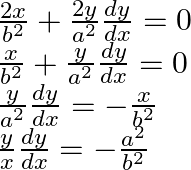Equation of the family of an ellipse having foci on the ![]() -axis and centers at the origin can be represented by
-axis and centers at the origin can be represented by ![]()
Differentiating the above equation with respect to ![]() on both sides, we have,
on both sides, we have,

Again differentiating the above equation with respect to ![]() on both sides, we have,
on both sides, we have,

Rearranging the above equation

This is the required differential equation.
